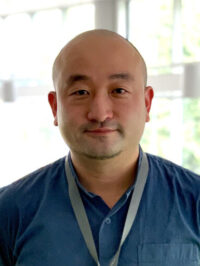
Associate Member
Assistant Professor, Department of Rehabilitation Medicine, University of Washington, Seattle, WA
BSc [Health Science] (Kanazawa University, Ishikawa, Japan)
Master of Athletic Training (Texas Tech University Health Science Center)
Doctor of Physical Therapy (Massachusetts General Hospital Institute of Health)
Master of Science (Thomas Jefferson University, Philadelphia)
PhD [Rehabilitation Science] (University of Washington, Seattle)
Postdoctoral Fellowship [Electrical & Computer Engineering] (University of Washington, Seattle)
Postdoctoral Fellowship [Physical Medicine and Rehabilitation] (International Collaboration of Repair Discoveries, University of British Columbia)
Research Interests
autonomic dysfunction; Autonomic Dysreflexia; autonomic recovery; Epidural stimulation; neural engineering; Neuromodulation; neuroscience; pelvic floor function; spinal cord injury; spinal neuromodulationDr. Soshi Samejima was recently appointed as an Assistant Professor of Rehabilitation Medicine at the University of Washington. His research focuses on neuromodulatory and rehabilitative approaches for autonomic and motor function following spinal cord injury.
Prior to his faculty appointment, Dr. Samejima completed his training in numerous spinal cord injury research groups. His most recent postdoctoral fellowship was completed as part of ICORD Dr. Andrei Krassioukov’s lab where he investigated spinal cord stimulation. In particular, Dr. Samejima studied spinal neuromodulation for pelvic floor function and cardiovascular function and also paved the way for accelerating clinical translations. Previously, he also completed a postdoctoral fellowship at the University of Washington as part of Professor Chet Moritz’s research group. There, Dr. Samejima studied a brain-computer-spinal interface aimed at restoring upper limb function after spinal cord injury.
Dr. Samejima earned his bachelor’s degree in physical therapy from Kanazawa University in Japan and a transitional doctor of physical therapy from MGH Institute of Health Professionals. He received his doctorate in rehabilitation science at the University of Washington, supervised by Dr. Chet Moritz.
Recent Collaborations:
Dr. Samejima collaborates with ICORD PIs, Dr. Andrei Krassioukov and Dr. Tania Lam in an endeavour to bridge the gap between academia, research, and the SCI community.
Recently, Dr. Samejima received funding from a Rick Hansen Foundation-supported ICORD seed grant as a co-investigator along with ICORD PI, Dr. Michael Berger. In collaboration, they are researching the safety and feasibility of home-based non-invasive spinal cord stimulation for orthostatic hypotension in individuals with severe autonomic dysfunctions. Rick
Awards
Some of Dr. Samejima’s recent major awards and accomplishments include:
- Paralyzed Veterans of America Postdoctoral Fellowship Award (2022-2023)
- American Spinal Injury Association Allied Health Travel Scholarship Award (2019)
- The 13th Annual Madrona Prize Award (2018)
- Brain Computer Interface Meeting Student Award (2018)
- Washington Research Foundation Innovation Graduate Fellow in Neuroengineering (2017-2019)
- Christopher and Dana Reeve Foundation Consortium Associate (2017-2018)
Recent publications
- Nakahara, R et al.. 2026. Translation and linguistic validation of the international standards to document autonomic function following spinal cord injury (ISAFSCI) for Japanese healthcare professionals.. Spinal Cord. doi: 10.1038/s41393-026-01173-6.
- Tsubaki, A et al.. 2026. Uncontrolled Orthostatic Hypotension and Multi-channel Cerebral Hemodynamic Changes in a Young Male Participant: A Case Report.. Adv Exp Med Biol. doi: 10.1007/978-3-032-10389-5_29.
- Sachdeva, R et al.. 2026. Regeneration and remyelination promoting effects of spinal cord stimulation following spinal cord injury: A scoping review.. Exp Neurol. doi: 10.1016/j.expneurol.2025.115519.
- Samejima, S et al.. 2025. Multi-system benefits of non-invasive spinal cord stimulation following cervical spinal cord injury: a case study.. Bioelectron Med. doi: 10.1186/s42234-025-00183-8.
- Samejima, S et al.. 2025. Cardiovascular safety of transcutaneous spinal cord stimulation in cervical spinal cord injury.. Neurotherapeutics. doi: 10.1016/j.neurot.2025.e00528.

